US Files Forfeiture Complaint For Iranian Weapons Seized By Navy
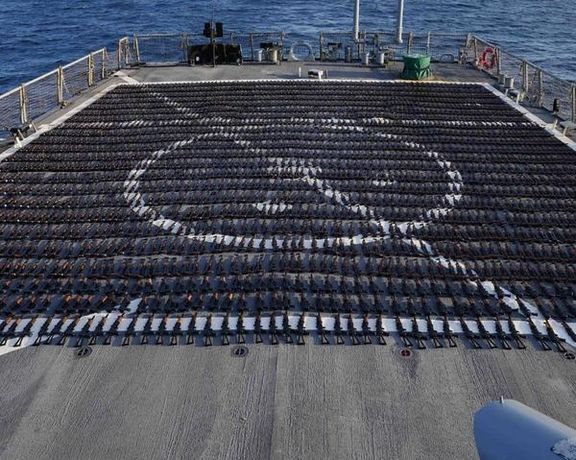
The US Justice Department filed a forfeiture complaint Friday for suspected Iranian arms confiscated by the US Navy from vessels in the Persian Gulf region since 2021.

The US Justice Department filed a forfeiture complaint Friday for suspected Iranian arms confiscated by the US Navy from vessels in the Persian Gulf region since 2021.
The Justice Department filed a forfeiture complaint against, “over 9,000 rifles, 284 machine guns, approximately 194 rocket launchers, over 70 anti-tank guided missiles, and over 700,000 rounds of ammunition that the US Navy seized in transit from Iran’s Islamic Revolutionary Guard Corps (IRGC) to militant groups in Yemen,” a statement said.
The arms were seized on four occasions, twice in 2021 and twice in 2023, from stateless small vessels in regional waters, apparently part of regular Iranian arms supplies to Houthi fighters in Yemen. Iran is also suspected of supplying drone and missile technology and production means to Houthis who overthrew Yemen’s government in early 2015.
“These interdictions led to the discovery and seizure of four large caches of conventional weapons, including long arms and anti-tank missiles, and related munitions – all of which were determined to be primarily of either Iranian, Chinese, or Russian origin,” the Justice Department said.
It also underscored that the seizure showed continued efforts aimed at stopping illicit weapons trafficking by the IRGC.
In March, the US government took forfeiture action against over one million rounds of ammunition “en route from Iran to Yemen.”
US government agencies with “assistance from US Naval Forces Central Command, will continue to identify, disrupt, and dismantle Iran’s illicit flow of weapons at every level to prevent Iran’s illicit activity in the region and globally,” HSI Washington, DC Special Agent in Charge Derek W. Gordon said.

As Europe says it will retain sanctions on Iran over its missile programs, the regime’s foreign minister says talks have begun with three European powers.
Iranian Foreign Minister Hossein Amir-Abollahian made the claim in an interview with Chinese TV channel Phoenix following Thursday's UN Security council’s session to discuss Iran’s nuclear advancements and its arms supply to Russia as well as Tehran joining the Shanghai Cooperation Organization (SCO).
“In the past several weeks, Iran has started talks with three countries of Germany, France and England,” he said, noting that “talks started in Norway and recently continued in Abu Dhabi, in the United Arab Emirates.”
Amir-Abollahian expressed hope that these talks are aimed at overcoming “misunderstandings,” paving the ground for the Islamic Republic and the E3 countries (France, UK and Germany) for “better interaction and cooperation.”
What the top Iranian diplomat described as “misunderstandings” are the implementation of the UN resolution 2231, which endorsed the 2015 nuclear deal. As part of the defunct agreement, UN sanctions imposed on the regime over its ballistic missile program are set expire in October, but the three European parties of the accord argue that Iran has violated the pact, therefore the sanctions should remain in place.
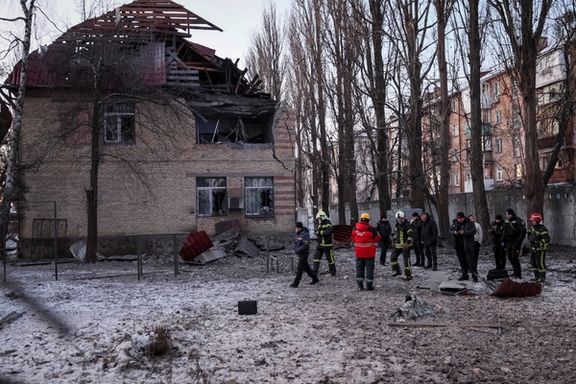
They base their argument on evidence that proves Iran is supplying weapons for the Russian invasion of Ukraine – on which Iran should have coordinated with the UN Security Council – and on IAEA reports that prove Iran is stockpiling highly-enriched uranium beyond the levels allowed in resolution 2231.
Amir-Abdollahian did not mention the drone supplies to Russia but Iran has maintained an ambivalent approach about its military dealings with Moscow. While it keeps repeating claims that Iran supports peace in Ukraine, it argues that the drones were sold to Russia before the invasion began, despite colossal amounts of evidence, including multiple Iranian Shahed drones shot down over Ukraine. In the latest development, satellite imagery indicates that the regime has also set up a drone manufacturing line in Tatarstan Republic to jointly produce the drones with Russia.
Western navies have also seized multiple shipments of Iranian arms in the Persian Gulf waters apparently destined for Houthis in Yemen, including in one instance missile and drone parts, in violation of existing UN sanctions.
At the same time, Rosemary DiCarlo, Under-Secretary-General for Political and Peacebuilding Affairs, said that during the Security Council’s session on Thursday, Iran and the Russian Federation claim there was no evidence linking the intercepted vessel and its cargo to Iran, and no clear indication that the seized components were of Iranian origin.
Amir-Abollahian's remarks also followed a phone call with the EU’s foreign policy chief Josep Borrell who warned the Iranian foreign minister against arms supplies to Russia. The European Union, multiple European countries and the United States have been warning Iran against supplying weapons to Russia since its Shahed Kamikaze drones were deployed by Moscow last year against civilian and military targets in Ukraine. So far, Russia has launched hundreds of these loitering munitions, mostly against infrastructure and centers of population.
Iran's FM also said in the interview that the Ebrahim Raisi administration is following two courses of action simultaneously to deal with the sanctions. “The first path is to try to neutralize the sanctions and the other path is to try to cancel the sanctions using the tools of diplomacy and negotiation. We move in both directions,” he said.

The Islamic Republic has been involved in the abduction in Iraq of a Russian-Israeli academic, an Iraqi official has told Israeli media.
While the Iran-backed militant group Kata'ib Hezbollah has denied any involvement in the kidnapping of Elizabeth Tsurkov, a Russian-Israeli academic and a PhD student at Princeton, an Iraqi official told Israel's Channel 11 that Elizabeth Tsurkov was arrested by Iraq's intelligence service - or someone posing as such - before being handed to Iran-backed Kata'ib Hezbollah which has been holding her for months.
On Thursday, a commander of the Iran-backed group had denied any involvement in the abduction. The Iraqi government spokesman also told Reuters on Friday that investigations are being carried out into the incident.
An expert on regional proxies across the Middle East including Turkey's proxies in Syria, she had traveled to several of the region's terror hotspots. Israel's Prime Minister's Office released a statement which confirmed Tsurkov is still alive, adding that the situation is being handled by the relevant bodies in Israel.
Tsurkov's mother Irena said they lost contact two months ago. "From what I had known until today, she was in Turkey, working on her research for Princeton. I didn't even know she was in Iraq," she told Israel's N12 News.
Israeli citizens are forbidden from traveling to Iraq — an enemy state where Kataib Hezbollah is one of the most powerful Iran-backed militia groups, with a history of attacking US targets in the area.

The new head of the German Federal Office for Information Security (BSI) warned of a growing threat from Russian, Iranian and Chinese cyber-attacks.
In an interview with Süddeutsche Zeitung on Thursday, Claudia Plattner said the threat situation in the network is "bigger than ever". Germany as a European power and supporter of Ukraine is an "attractive target" for hacker groups, she added.
"The goals are espionage, destabilization and influence," said Plattner, who took office on July 1. “An increase in the number of attacks can also be observed from China and Iran.”
The German security authorities are concerned that pro-Russian activists, cybercriminals, and hacker groups from the Russian secret services are joining forces to attack Western systems, the report added.
Recently, websites of authorities and other important institutions have been paralyzed repeatedly. Many experts regard the fact that 5,800 wind turbines in Germany failed last spring as a result of a suspected Russian hacker attack.
The BSI head also called for the critical infrastructure in Germany to be better protected. Solutions are needed to "stop and fend off" attacks, she told Süddeutsche Zeitung, "just holding your hands up is not enough."
Federal Interior Minister Nancy Faeser (SPD) plans to give the Federal Criminal Police Office more powers so that it can actively defend against a hacker attack. Details of the plans are not yet known, but experts warn of the risks of interfering with third-party systems.
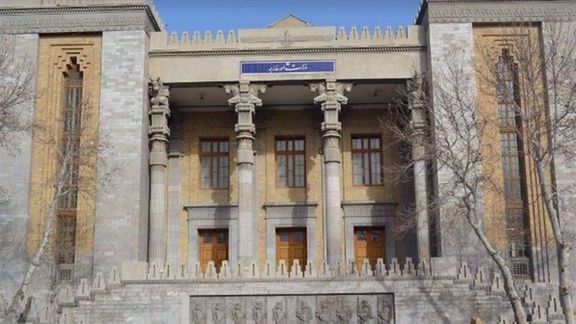
Iran has summoned Britain's ambassador in Tehran, Isabelle Marsh, in response to a series of fresh sanctions imposed by the United Kingdom.
Foreign Secretary James Cleverly announced on Thursday that sanctions will expand following continued human rights violations and hostile actions against its opponents on UK soil.
The amped up sanctions from the UK, one of a long list of countries sanctioning the regime, were branded "continued destructive and interventionist actions" according to state news agency IRNA, Iran's foreign ministry slamming the move as "an illegal and interventionist action".
The new sanctions by London will expand existing penalties imposed by creating new criteria under which individuals and entities can be targeted.
According to AFP, they include any Iranian activities "undermining peace, stability and security in the Middle East and internationally", and the "use and spread of weapons technologies from Iran".
Moscow has been accused of using Iranian-made kamikaze drones in Ukraine, while Tehran is a close strategic ally of Syria, and supports Lebanon's Hezbollah.
The latest measures add to ones already taken by the UK over the Islamic Republic’s response to nationwide protests following the death in custody of Mahsa Amini in September.
The 22-year-old Kurdish-Iranian had been detained for allegedly violating Iran's strict hijab rules for women.
Since the start of 2023, London has imposed dozens of asset freezes and travel bans on Iranian individuals and organizations including IRGC commanders and Tehran's prosecutor general for their role in human rights abuses.
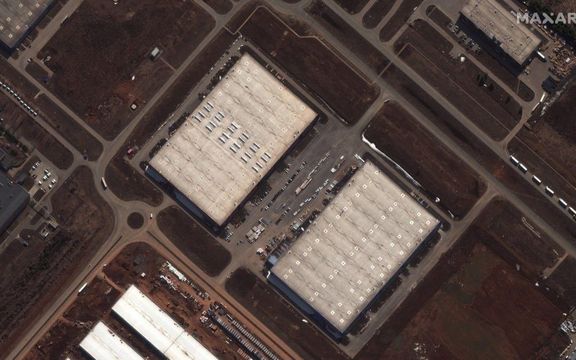
Russia is importing Iranian expertise for its drone factory being built to manufacture Russo-Iranian drones.
The factory in Russia’s Republic of Tatarstan, will be fully operational as early as next year, with recruitment in full force.
Several of the jobs posted since April for the site are seeking Farsi speakers, based on research by Airwars, a conflict monitoring group based at Goldsmiths, University of London.
The Iranian interpreters will be required to travel, perform simultaneous translation and translate technical documents, according to a report in the Financial Times.
Located in a business park near the town of Yelabuga, Moscow has converted an agricultural unmanned aerial vehicle maker to supply its war effort in Ukraine. Images show the vast complex is well underway.
Albatross, the company operating on the site has produced reconnaissance drones for President Vladimir Putin’s defense ministry, with roughly 50 delivered for combat in eastern Ukraine.
The factory is at the center of an expanding tech partnership with Tehran, whose expertise Moscow has relied on to establish a domestic drone-building capability to support its invasion and further skirt western sanctions.
Samuel Bendett, an expert on autonomous weaponry at the Center for Naval Analyses, told the Financial Times: “If Russia wants to do something covert with Iran, this is an advantageous location. It’s on the river that flows into the Volga, so you can bring parts by ship from Iran covertly.”
Iran has supplied Russia with hundreds of Shahed “kamikaze” loitering drones, which have been flown in swarms into Ukrainian infrastructure and neighborhoods. The investigation by FT and Airwars have not, however, found proof that a Shahed drone is being manufactured at the plant.
According to US intelligence, Moscow has procured hundreds of the suicide drones from Tehran. The White House claimed Alabuga was a still-expanding industrial site where an Iranian-Russian drone plant could become fully operational early next year.
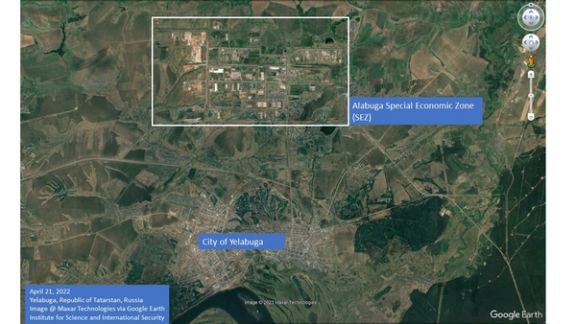
Photos and videos from Russian social media and local media outlets indicate Albatross commenced some drone production at the site in January. Albatross described itself as a maker of commercial drones for agricultural purposes and mapping.
Iran’s drone program has been growing steadily since the 1990s. Bendett, from the Center for Naval Analyses, said: “The Iranians already have a mature, proven technology. Iranian drones are in that sweet spot between those very expensive drones that can range very far and those smaller drones that don’t fly more than 100km. It’s a fairly sophisticated enterprise.”
Iran has supplied UAVs to proxies and partner countries since the early 2000s, both through direct weapons transfers and through the provision of UAV assembly kits. Venezuelan president Nicolás Maduro confirmed in 2012 that his government bought drone manufacturing technology, as well as infrastructure, from the Iranian regime.
Iran’s foreign ministry spokesperson, Nasser Kanaani, last month said the Islamic republic had not provided any sides at the war with weapons and called the allegations “politically motivated”. “Those who make these claims have not shown any evidence to prove their claims,” he said.